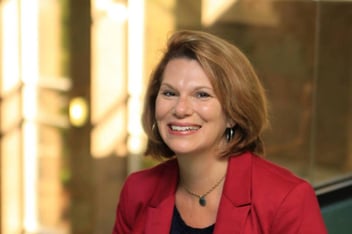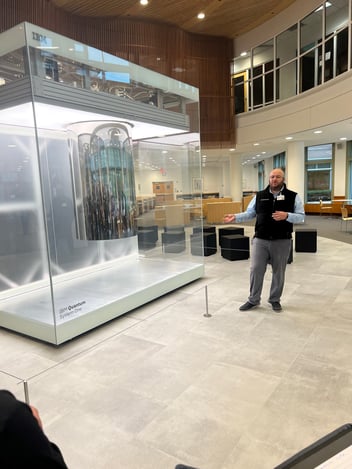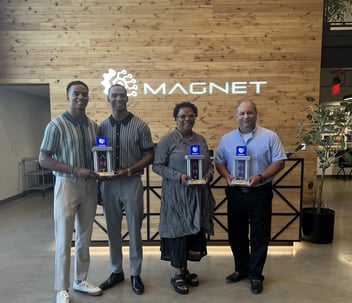Manufacturers Learn and Grow on Diversity, Equity and Inclusion
For the past two years, the Manufacturing Leadership Team has been working together with MAGNET’s and Greater Cleveland Partnership’s (GCP) intermediary teams to grow and invest in diversity, equity and inclusion (DEI), both personally and in the members' businesses. While each company uses its own process, the monthly roundtable, which began this past March, offers a chance for everyone to share best practices and reflect on internal conversations.
Here, we’d like to share some details on how this important DEI work has started and where it is going, along with suggestions and action steps for other companies looking to begin or continue relevant efforts.
DEI has been a priority since the start of the Workforce Connect Manufacturing Sector Partnership in 2019. The intermediary teams and its identified leaders started with a focus on developing an inclusive group of manufacturing leaders and leveraging the GCP’s DEI assessment for each of those leaders’ organizations to use to examine their internal culture. This assessment captures employee demographics, supplier diversity efforts and organizational best practices around diversity and inclusion from companies across a variety of industries, both GCP members and nonmembers. The 12 manufacturers represented on the MLT (Nordson, Oatey, Lincoln Electric, Swagelok, Jergens, Enprotech, Talan Products, Mace, Alloy Engineering, Elsons International, Lefco and E.C. Kitzel) all took this assessment. Their results were analyzed and compared to other companies within the manufacturing industry to benchmark results from other industries, which allowed for a better idea of where the MLT companies stood in the employer DEI landscape.
The MLT's cumulative results led them to establish the MSP Scholars program, an opportunity for black engineering students to access scholarship funds, world-class work experiences and executive mentors, and a build a network in Northeast Ohio's manufacturing industry. This initial work also perpetuated a desire to learn more about where each company stood and what practices and interventions would be helpful in their continued work.
Brandi Baker (MAGNET) and Chris Nance (GCP) led this portion of intermediary teamwork, meeting with each MLT member and representatives from each of their companies one-on-one. Every participating company was open to authentic conversations and willing to listen. The same way this group dedicated itself to developing ACCESS to Manufacturing Careers, it was excited to create a community DEI practice. With humility and the knowledge of the growth to be had beyond this initial assessment, the group suggested regularly scheduled roundtables to help companies of all sizes and at all points in the DEI process engage in learning, discussions, best practices and issue processing.
The conversations, which includes both executive and HR/Ops leadership from each participating company, generated shared DEI objectives:
- Every company will benefit from learning about each other’s DEI journey, knowledge, experiences and best practices through a peer-to-peer learning model.
- Explore DEI strategies fit for large, medium and/or small manufacturing firms
- Continue to collaborate as MLT companies, to build a reputation of thought and action leaders driving regional manufacturing industry forward.
Despite initial apprehension from all companies to title themselves a DEI expert, two companies emerged to lead the initial sessions: Nordson Corporation and Oatey Company (who has people speaking more than 20 languages on its Cleveland plant floor), both larger companies with worldwide plants. Their familiarity with diverse populations helped both organizations kickstart their DEI journeys in 2020 and made for good information and experiences to share with the larger group.
Kathleen Lesner Hall, Nordson’s VP of Human Resources, led the first roundtable and offered Nordson’s well-developed, four-pronged strategy that address DEI workplace issues:
- Recruit: Initiatives to diversify both interview panels and slates of candidates, with a broad definition of diversity (age, gender, ethnicity, tenure and work area for interview panels)
- Develop: Ongoing education of Talent Acquisition team and expanded Leadership Development programs like Grow@Nordson
- Promote: Ensure that promotion and career decisions are equitable across Nordson
- Retain: Use engagement surveys to enhance employee listening and expansion of Employee Resource Groups (ERGs)
Hall also shared Nordson’s commitment to continued growth in these areas and emphasized the importance of tracking and measuring these initiatives.
Dalithia Smith, Oatey’s Chief Human Resource Officer, led their presentation. Go on a tour of the Oatey facility and you’ll see its commitment to a diverse workforce. Start with the map in the employee breakroom, decorated with pins for every country from which Oatey has a native associate. Despite this existing culture, Oatey began a formal strategy centered around empathy in the summer of 2020 featuring townhall listening sessions and a newly created advisory committee comprising organization leaders and associates. Smith detailed how Oatey is establishing a top-down empathetic culture.
Like Nordson, Oatey has identified strategic pillars to guide this work: talent acquisition, human capital management, organizational culture, community, and social responsibility, training and education. They have also has begun and expanded numerous programs to help employees and improve the organization’s commitment to diversity, equity and inclusion. They’ve recommitted to increasing the number of diverse suppliers and offering trainings to all staff.
Nordson and Oatey’s presentations sparked deep and thoughtful discussions amongst the group. Companies with less developed strategies were able to ask questions in a judgement-free, collegial environment. One MLT leader shared that these roundtables were crucial in helping him develop a longer-term DEI strategy for his company.
In a highly competitive marketplace, job seekers are looking to be seen, heard and feel valued part as part of a company. In that spirit, the Manufacturing Sector Partnership from Cuyahoga County offers these points:
- Be open to genuine conversations. Open, honest engagement from each company about their strengths and weaknesses has produced the most value regarding DEI development.
- Be willing to learn and unlearn.
- Take a DEI assessment. The Cuyahoga County MLT used the GCP assessment. You can click here to access that assessment, or use another one that you find fits your company best.
- Connect to your local sector partnership/MEP/intermediary. This past week we hosted a national workforce conference for Manufacturing Extension Partnerships across the country, and all of them are committed to furthering this work. Find out who is local to you and connect with them!
We are excited to continue this work with the great partners on the Manufacturing Leadership Team as we all continue to learn and grow in this essential area for talent development.


